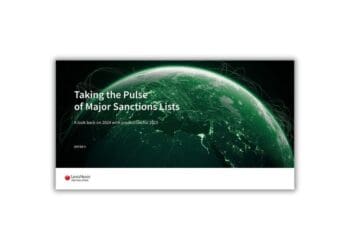The Importance of Innovation
As the global geopolitical landscape grows ever more complex, keeping track of the vastly complicated web of international economic sanctions has become a formidable challenge. In order to steer clear of penalties and avoid reputational damage, compliance departments are going to have to embrace innovation.
Keeping up with the latest popular television shows was once a relatively simple proposition. With only a handful of major channels vying for your attention, all you had to do was set aside an hour or two each week and you’d have everything you needed to participate in Monday’s water cooler conversation with your co-workers. Today, we’re living in a so-called “golden age,” with dozens of critically acclaimed, “must-watch” shows available online and on demand. For TV fanatics, it’s a great time to be alive. Those of us with more pressing things to attend to than sitting on our couches and watching TV, though, often find ourselves wondering: “How in the world am I supposed to keep up with all of this?”
It’s a question that compliance professionals can relate to, especially when it comes to sanctions. As the global geopolitical landscape continues to grow more complicated, there is a growing array of trade restrictions, the targets of which are in a near-constant state of flux. In just the past few weeks, alterations have been explored or enacted to sanction programs targeting entities in North Korea, China, Russia, Iran and Venezuela. The changes show no sign of letting up any time soon.
Identifying sanctioned entities and all of their issued securities, as well as detecting domestic or foreign subsidiaries (or other holdings of more than 50 percent) is a challenging task. Even trickier is deciphering the complex web of beneficial ownership rules and relationships. Corporate actions may influence the sanctioned securities, and an investment into structured products may increase the risk as well. Determining if sanctioned individuals have beneficial ownership is a critical step in putting together firms’ list of “do not trade” securities that adds to the compliance challenge. On top of this, the information must be fed into the enterprise data management system, rules have to be programmed and all of the data needs to be constantly kept up-to-date.
How can financial institutions keep track of all these tasks while keeping their operation running smoothly? Those charged with protecting their firms against penalties can understandably feel like they’re constantly struggling to keep pace.
Without a well-thought-out strategy, though, financial institutions run a daily risk not just of getting fined, but of incurring serious reputational damage as well. According to figures published on its website, the U.S. Treasury Department’s Office of Foreign Assets control has already doled out more than $100,000,000 in penalties so far this year. Firms can’t simply cross their fingers and hope not to be next. While some may be able to afford the financial hit, the public relations damage can endure for years.
Compliance departments are going to need to innovate if they want to keep up with the constant stream of new restrictions. Putting together the comprehensive, accurate and up-to-date lists of sanctioned securities needed to avoid penalties is an undertaking that challenges even the largest and most advanced organizations.
There are compliance departments that think they can save themselves from penalties simply by being cautious. If there’s uncertainty about the beneficial ownership of an asset, they simply won’t trade it. But this approach, while allowing firms to evade the ire of enforcement agencies, ultimately causes damage. If firms compensate for their lack of comprehensive information about sanctioned entities by passing up on perfectly good trades, they are bound to leave money on the table and put themselves at a significant competitive disadvantage.
Rather than fruitlessly struggling to compile all of the necessary information by themselves, compliance departments need to innovate. New technology, or so-called RegTech, offers new possibilities for firms to automatically receive up-to-date and comprehensive daily lists of securities and entities to steer clear of in trades. These tools enable compliance staff to focus on more urgent and productive tasks, freeing traders to operate confidently and efficiently. Firms can create fully automated systems that sift through the huge quantities of necessary data, automatically alerting traders when they are in danger of violating the law and providing them with information about which sanctions a trade violates and how an instrument is attached to a sanctioned entity, saving them from the need for time-consuming research.
These innovations don’t merely enable firms to keep up with the task of managing sanctions data. They make it possible for them to operate more safely and efficiently than ever before, even when sanctions regimes were relatively simple. Trades can go through without hiccups, and firms can have faith in their compliance without having to manually check each transaction. Most importantly, once compliance staffs have been freed from the constant research that sanctions once necessitated, they will be able to devote themselves to protecting their firms against more complex and serious risks. They may even have some time left over to watch TV.



 Phillip Lynch is the Global Head of Markets, Products & Strategy at
Phillip Lynch is the Global Head of Markets, Products & Strategy at 








